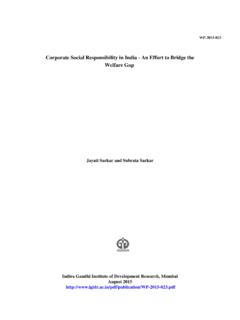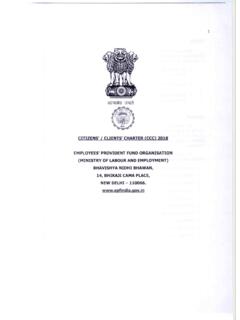Transcription of Contract Labour Act in India: A Pragmatic View
1 IGIDR Proceedings/Project Reports Series PP-062-33 Contract Labour Act in india : A Pragmatic view Meenakshi Rajeev Quantitative Approaches to Public Policy Conference in Honour of Professor T. Krishna Kumar Held in conjunction with the Fourth Annual International Conference on Public Policy and Management Indian Institute of Management Bangalore (IIMB) 9-12 August 2009 School of Business and Management Indira Gandhi Institute of Centre for Public Policy Queen Mary, University of London Development Research Indian Institute of Management London, United Kingdom Mumbai, india Bangalore, india 1 Contract Labour Act in india : A Pragmatic view Meenakshi Rajeev* Abstract Labour management is one of the most crucial task of an entrepreneur.
2 In order to surpass the stringent Labour regulations, the industry sector in india is largely resorting to Contract labourers, who are governed by the Contract Labour Regulation and Abolition Act of 1970 . A primary survey carried out in Karnataka one of the most industrially developed state in india , reveals that many of the stipulations made in the Act to safeguard Contract labourer are not followed in practice. It has also been felt by the workers that collusive agreement between the Labour inspector, the protector of law, and the principal employer , the manger or the entrepreneur (or the contractor) has aided the violation of law. This paper discusses some of the survey findings and considers a game theoretic model to show why it is economically optimal for an enterprenuer and a Labour inspector to collude.
3 It also examines whether any provision of reward for the Labour inspector would help to protect the law. Though the paper is based on Indian experience, it has relevance for a number of economies in the Asian region. * Faculty, CESP, Institute for Soc ial and Econo mic Change, Bangalore-72, This paper is a part of a larger project on Contractual Employ ment in Selected Manufacturing Enterprises in Karnataka . I gratefully acknowledge financial support from Sir Ratan Tata Trust. I also thank Prof. Kaushik Basu for a useful discussion. Usual disclaimer applies. The paper was presented at the First Annual Meeting of the Asian Law and Econo mics Association at Seoul National University, Korea.
4 2 Introduction In this age of globalization, the employment structure across the globe has been undergoing changes in all nations. In order to effectively compete in a globalized market, one needs flexibility relating to Labour , capital, or bureaucracy; this allows a producer to adapt to the fast- changing world and compete effectively. In particular, it is argued that stringent Labour regulations not only put domestic producers at a disadvantage but also deter foreign direct investment and eventually impact adversely on investment, output and employment. Over the last two decades, a number of countries have attempted to liberalize their respective Labour markets and have also amended their Labour laws so as to make them more investment- and employment-friendly a process that has weakened job security and collective bargaining (Agarwal, 2001).
5 In Bangaladseh, for example, globalization is found to reduce the number of employees working under permanent contracts and to create non- traditional employment structures including part time , casual and Contract Labour (Khan, 2005). In the context of the Philippines, McGovern (2005) mentions that .. Labour flexibilization is used synonymously with contractualization or casualization of Labour . In india too we observe an increasing use of casual / Contract or other such non informal Labour over time (Deshpande et al 20041, Rajeev, 2008). Among different kinds of employment that have been created in various economies to circumvent Labour laws, Contract Labour is becoming one of the prominent forms.
6 If we assume that such a flexible form of employment is indeed necessary in a competitive world, then how do we extend social protection to this section of Labour ? It has been observed in Bangladesh that with such informalization of Labour , social security of workers, in general, have decreased and workers are often terminated without benefits (Khan, 2005). Commenting on Asian women workers in general, Agnes Khoo2 remarks that such contratualization has made women workers highly vulnerable to and unprotected against the whims of management. In india , Contract labourers are protected by the Contract Labour Regulation and Abolition Act, 1970. A Contract labourer is defined in the Act3 as one who is hired in connection with the work of an establishment by a principal employer who is the firm owner or a manager through a contractor4.
7 The act makes a number of provisions for the welfare of the Contract workers including payment of minimum wage , social security benefits and others. At various points of time Government amended the law with a view to make it more Labour friendly. However, such amendments can be of help to the workers only if implementation of the law is ascertained. In order to have a reality check, we have carried out a survey of the status of Contract Labour in an industrially advanced state in india , viz., Karnataka. It has been observed during our field visits that whatever protections have been provided by the law are not adhered to in practice. This features is not special to india , but is observed in the context of other developing nations as well.
8 For example, in his study on the South African situation, Theron (2002) mentions that in spite of having many laws like Basic Condition of W orkers Act, the Equity Act etc., lack of enforcement makes it futile to have laws : On the surface all is well. On the ground, things could hardly be worse Theron(2002). In Bangladesh too Khan (2005) observes that Labour laws are not implemented in most of the privately owned industries. In the Indian case, Kumar (2002) Blames it on the fact that for a Contract worker it is not only hard to prove his/her identity as workers under the Labour law, but employer- employee relationship is also not easy to establish. 3 At this backdrop it is crucial to examine how far the existing laws are implemented especially by the private sector enterprises in india .
9 Our field survey reveals that collusive agreement between the Contractor (or, the inspector- the protector of law), and the principal employer often aided the violation of the law. This paper discusses some of the survey findings and formulates a game theoretic model to show why it is economically optimal for the inspector and the employer to collude. More importantly, the paper examines whether any provision of reward for the Labour inspector would help protect the law and enhance the welfare of the vulnerable Contract Labour class. In the next section the Contract Labour Abolition and Regulation Act, 1970, has been discussed in some detail. The section that follows delineates some of the survey findings.
10 The penultimate section poses the problem in a game-theoretic framework. W hile the next two sections describe the Indian scenario, the theoretical formulation considers a general situation. Implications of the theoretical model, therefore, are relevant for most developing nations that are facing the problem of compliance of law. The concluding section sums up the findings. Contract Labour Regulation and Abolition Act, 1970 In india , Contract labourers are protected by the Contract Labour Regulation and Abolition Act, 1970. A Contract labourer is defined in the Act1 as one who is hired in connection with the work of an establishment by a principal employer through a contractor. W hile a contractor is the supplier of Contract Labour for the organisation, a principal employer is the person responsible for the control of the establishment.












